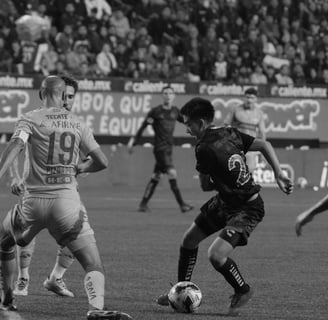Mexican National Team Flourishes Against Inter de Porto Alegre in Friendly Match
Cristian Diaz
1/17/20254 min read


Match Overview: A Friendly with High Stakes
The recent friendly match between the Mexican national team and Inter de Porto Alegre carried considerable significance, despite being held outside the designated international FIFA window. Due to the restrictions imposed during this period, Mexican coach Javier Aguirre faced the unique challenge of assembling a squad exclusively comprised of domestic players. This limitation not only tested Aguirre’s tactical acumen but also provided an opportunity to evaluate various players who may not frequently feature in the national setup.
This match served as an important platform for domestic talent to showcase their abilities on an international stage. Given the competitive nature of football, the stakes were high for these players hoping to earn recognition and establish their credentials within the national team framework. Such opportunities are crucial, especially as the Mexican national team gears up for future tournaments, including the upcoming World Cup qualifiers. Thus, the outcome of this friendly match is more than just a scoreline; it can influence player selections and tactics moving forward.
Game Dynamics: How Mexico Overcame Early Pressure
The friendly match between the Mexican National Team and Inter de Porto Alegre demonstrated a compelling contrast in the early stages, where the latter initially held a strong advantage. Inter de Porto Alegre showcased their attacking prowess, utilizing an aggressive possession-based approach that put pressure on Mexico. Their ability to maintain control of the ball allowed them to create several scoring opportunities, which tested the Mexican defense significantly.
Despite the mounting pressure, the Mexican team's resilient defensive strategies played a pivotal role in withstanding Inter's advances. Key players emerged as defensive stalwarts during this challenging phase, with the central defenders displaying exceptional composure under pressure. Their ability to read the game and anticipate the opposition's movements was critical in disrupting Inter de Porto Alegre's rhythm and minimizing the effectiveness of their offensive plays.
As the first half progressed, Mexico began to find their footing. Leveraging the defensive resilience demonstrated earlier, they transitioned into a more composed approach, gradually reclaiming control of the game's tempo. This shift not only relieved the pressure on their defense but set the stage for potential counterattacks, marking a critical turning point in the match. The interplay of these strategies laid the groundwork for Mexico to ultimately flourish despite an initially perilous situation.
Counter-Attacking Mastery: The Goals that Sealed the Victory
The match showcased a compelling demonstration of counter-attacking football that led to Mexico's decisive victory. Mexico capitalized on their opponent's mistakes, culminating in two well-earned goals that highlighted the effectiveness of their strategy.
In the 34th minute, Jesus Gallardo of Toluca was able to combine with Jorge Ruvalcaba of Pumas with a lovely one-two. Ruvalcaba dummied the ball so that it would fall to Erik Lira of Cruz Azul, who would blast it into the back of the net to make it 1:0 for Mexico.
San Bernardino’s Jorge Ruvalcaba was unlucky not to get the better of the Brazilian Goalkeeper as he scuffed his one-on-one chance early on in the match, but would make good on his second big chance of the night. In the 45th minute, Ruvalcaba would receive a lovely long ball from Pachuca’s Elias Montiel, break past the Brazilian defense and find himself one on one with the goal keeper. Ruvalcaba put the ball away in convincing fashion to make it 2:0 for El Tri. The assist provider for this goal, Elias Montiel, was recently named the 3rd best player in the Intercontinental Cup behind the likes of Mbappe and Vinicius Jr. Montiel looks to be cementing himself as a force to be reckoned with.
The Brazilian side would try to rally back into the game, but Mexico was able to withstand their onslaught with good defensive performances from Chivas Players like Jorge Castillo, goalkeeper Tala Rangel. Xolos Winger and Los Angeles native, Efrain Alvarez also had a good showing, creating a handful of chances for his teammates.
Xolos youngster Gil Mora would go on to debut in the 86th minute. The sixteen-year-old center attacking midfielder would go on to make history as the youngest ever player to feature for the Mexican National team, and was unlucky not to get a goal or assist late on in the match. The future looks bright for Mora as he looks to be one of the brightest young stars to come out of Mexico these last few years.
Looking Ahead: Youth and the Future of Mexican Football
The recent performance of the Mexican national team against Inter de Porto Alegre offers a promising glimpse into the future of Mexican football, particularly through the lens of youth development and the nurturing of local talent. As football evolves, the importance of integrating young players into the national squad cannot be overstated. The match showcased several emerging talents who demonstrated not only skill but also the ability to adapt to high-pressure situations, indicating a bright future for the national team.
Coach Javier Aguirre's emphasis on youth is a strategic move aimed at revitalizing the team’s dynamics. By providing young players with international exposure, he is setting the foundation for a new generation of footballers who can compete at higher levels in the future. This focus on cultivating local talent allows the team to build a squad that reflects the depth and diversity of the country’s footballing capabilities. The positive feedback received from Aguirre regarding the players’ performances suggests that his philosophy is resonating well within the team. It illustrates the coach's belief in a progressive approach, where upcoming stars are given the opportunity to shine on international platforms.
